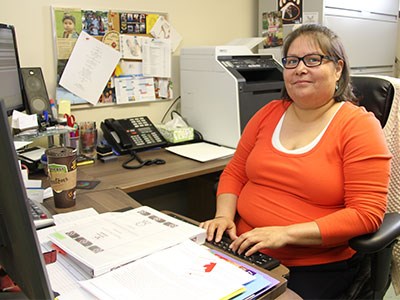Every year hundreds of people walk through the doors at downtown Sudbury's N’Swakamok Native Friendship Centre with the hope they can find meaningful employment.
The centre offers a number of services that range from health care, to education, and, of course, employment.
Rachael Flamand, the N’Swakamok Native Friendship Centre's employment co-ordinator, gives her clients the resources they need to find jobs in their fields.
Each day Flamand scours job boards in Sudbury and shares the openings with her clients.
She also teaches soft employment skills, such as resume and cover letter writing.
The centre keeps a database of job seekers along with their respective skills and qualifications.
Loraine Migwans, the centre's career developer, has fostered relationships with employers she can call on to hire full-time employees, if they are needed, or apprentices.
“What I do as a career developer is to help make a match with employers and clients,” Migwans said.
Her growing database of employers includes mining company Mohawk Garnet, and Sudbury contractors Patrick Mechanical and William Day Construction.
Most clients are from First Nation reserves outside Sudbury's borders. Many come to Sudbury for post-secondary education and work opportunities, Flamand said.
The N’Swakamok Native Friendship Centre receives funding under Employment and Social Development Canada's Aboriginal Skills and Employment Training Strategy to subsidize the cost of an apprenticeship.
Flamand said she recently helped a millwright land an apprenticeship with Mohawk Garnet by covering a portion of his wage through the federal funding program.
But despite opportunities for financial support, Migwans said it remains difficult for her clients to find apprenticeships. “There's a high number of apprentices out there who are still looking for an employer,” she said.
To cross that divide Migwans said she has partnered with the Sudbury and Manitoulin Workforce Planning Board to share resources and find new opportunities for her clients and would-be apprentices.
Migwans has also started a job readiness program for Aboriginal youth over the age of 18 who are working on obtaining their high school diploma.
Many of the participants in the four-week program are attending the N’Swakamok alternative school program, which helps mature Aboriginal students complete their high school education through Sudbury Secondary School.
Patrick Bennett, a participant in the job readiness program, said Migwans has taught him how to approach employers. The program has also helped improve his self- confidence, he said.
Andrew Pelletier, also a participant in the job readiness program, said he hopes to become a computer programmer. Pelletier said the program has helped him work on his soft employment skills and be more comfortable in his social interactions with potential colleagues and employers.
The job readiness program has implemented First Nations ideologies, such as the medicine wheel – which represents the balance between the physical and spiritual self – to help participants manage their own job readiness within their cultural context.
Even with the challenges her own job poses, Migwans said the success stories make it all worthwhile. “I enjoy helping people,” she said. “There's nothing more rewarding than to see somebody, or even get a phone call saying, 'Hey, I graduated and I got a job.'”




